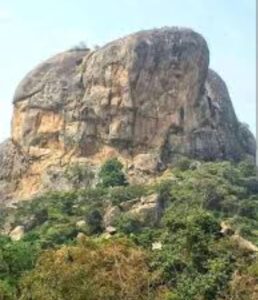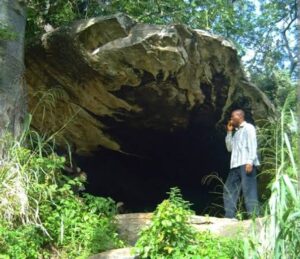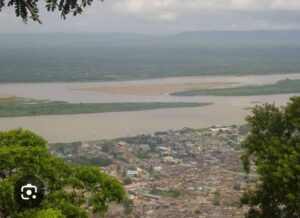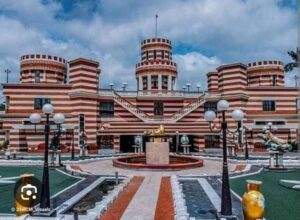

By Dada Ahmed.
Kogi State is a geopolitical entity created on August 27, 1991, by the regime of General President Ibrahim Badamasi Babangida. Located in Nigeria’s Middle Belt, windowed with a wealth of untapped tourism potential that could be transformative for its economic landscape, growth and development.

The Obangogo mountain resort in Kabba.
Photo credit: Google.
One prominent inscription on vehicle license number plates registered in Kogi State is the phrase, “Kogi, the Confluence State,” which catches the eye of many curious individuals across Nigeria. While this phrase is vivid and concise about the tourism potential of the state, enthusiasts in the tourism sector hope it could be expanded to read, “Kogi, the Tourism Hub of Nigeria.” They believe this would better highlight, promote, and appreciate the state’s vast tourist potential.

Insights into ekuechi festival in Egbiraland.
No doubt, Kogi is often overshadowed by more widely known destinations, yet it holds unique attractions that could capture the imagination of tourists with its rich history, diverse cultures, and picturesque landscapes—the ingredients necessary for it to become a vibrant tourism hub. Historians believe that leveraging tourism could significantly bolster the state’s economy, create jobs, and foster sustainable development, as well as cultural integration among its diverse population.

Ekuku cave in Okene.
Tourism, according to experts, refers to the act of traveling to different places for leisure, business, or other purposes. It involves activities and experiences associated with visiting destinations away from one’s usual environment, such as sightseeing, exploring natural or cultural attractions, attending events, and staying in accommodations like hotels or resorts.
Experience shows that Kogi is a state where tourism activities, as described above, can be fully enjoyed. Some of the prominent tourist sites in the state include Mount Patti, 1,500 feet above is level located in Lokoja and offers a panoramic view of the confluence of the Niger and Benue Rivers. The stunning confluence of these rivers in Lokoja offers breathtaking views and historical significance.

The Confluence where River Niger and Benue meet and flow as one entity.
The Confluence Beach, where river Niger and Benue with its serene environment, could become a premier destination for relaxation and water sports. The ancient Owu Falls near the town of Okene is another tourist site to behold as it presents a natural wonder that could attract eco-tourists and adventure seekers.

Italo festival of Igala nation.
Kogi’s cultural heritage provides a rich tapestry for tourism. The state is home to a variety of ethnic groups, each with its own traditions, festivals, and cuisine. Events such as the Ebe festival of the Ebira people, the Italo festival in Igala land and the traditional Durbar festivals , particularly in Lokoja,the capital of the state,could be promoted to showcase the vibrant cultural life of the region. By developing cultural tourism initiatives, Kogi could attract visitors eager to experience authentic Nigerian traditions.

The Palace of the late Ohinoyi of Ebiraland, Dr.Ado Ibrahim.
Other notable sites that dotted the landscape of kogi include the Old Slave Trade Museum, Basin Hill, Kogi State Museum, the beautiful palace of the late Ohinoyi of Ebiraland, Dr. Ado Ibrahim, Giant Waterfalls at Okehi, and the Ajaokuta Steel Company. Other sites are;Idah Historical Sites, Ugwolawo Lake, Ohu State Forest Reserve, and Ogbunike Caves which contribute to Kogi’s diverse tourist offerings.
The tourist endowment of Kogi notwithstanding, there has been concern by many discerning individuals that the state needs more investment in its historic sites to make them appealing to tourists. They call on the state government and members of the private sector to summon the courage to develop industries that support sectors boosting tourism, such as transportation (airlines, buses, trains), hospitality (hotels, restaurants), travel services (tour operators, travel agencies), and attractions (museums, parks, historical sites).
The economic impact of tourism extends far beyond direct revenue from visitor spending. Tourism creates jobs in hospitality, transport, and retail sectors, contributing to reduced unemployment rates. Local businesses, from restaurants to craft shops, benefit from increased patronage, which stimulates economic growth and fosters entrepreneurship. Infrastructure development, such as improvements in roads, public transportation, and amenities, enhances the visitor experience and improves residents’ quality of life.
Experts suggest that Kogi must adopt a strategic approach involving government and private sector collaboration to develop a comprehensive tourism plan. This plan, they further advised should include marketing, infrastructure development, and community engagement. Promoting Kogi’s attractions through targeted marketing campaigns and establishing partnerships with travel agencies can raise the state’s profile as a tourist destination, the experts stressed.Training and capacity building for local businesses and residents are crucial for tourism development, equipping locals with skills in hospitality, customer service, and tour guiding.
It is instructive to note that the road to making Kogi State a tourism destination is fraught with challenges. While the potential is immense, issues such as inadequate infrastructure, security concerns, and environmental sustainability need careful planning and management.
Tourism development must be inclusive and respect local cultures to ensure long-term success.
In all and without mincing words,it is instructive to say that Kogi State stands at the threshold of a promising opportunity in tourism development. Experts agree that by harnessing Kogi’s natural beauty and cultural richness, the state can create a thriving tourism sector that not only boosts the local economy but also enhances its global profile. With concerted effort from both the government and the private sector, Kogi can transform itself into a leading tourist destination, driving economic growth and improving the quality of life for its residents.
Ahmed, a writer on tourism, publishes The Reporters.


